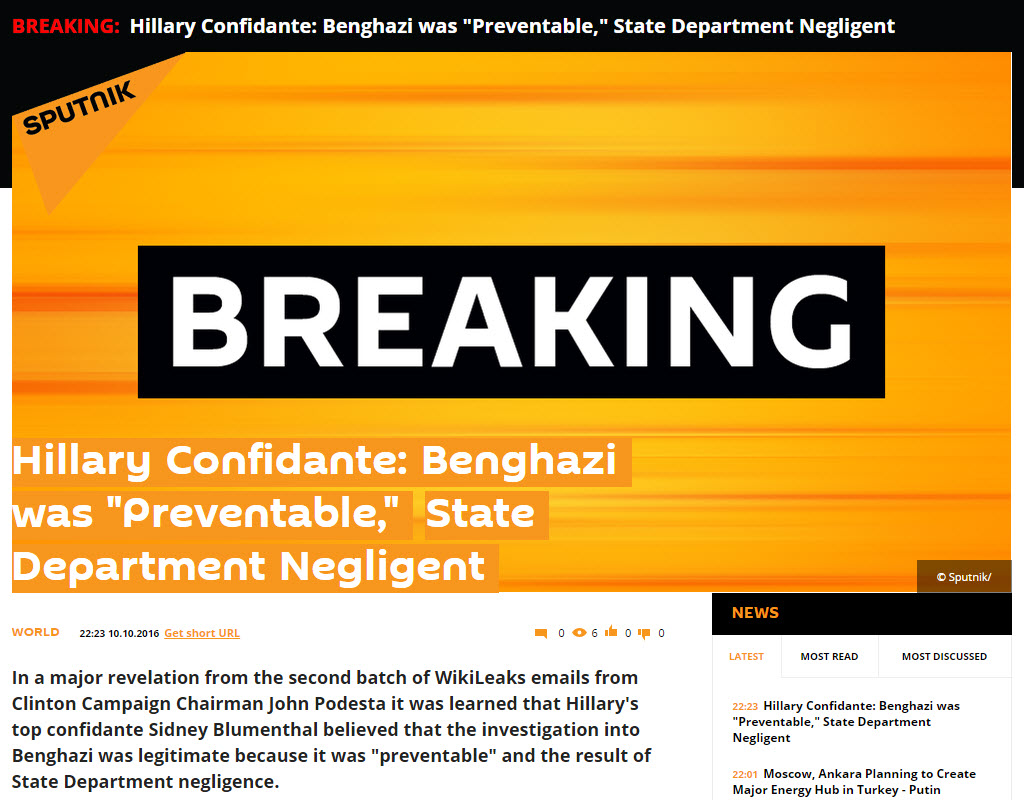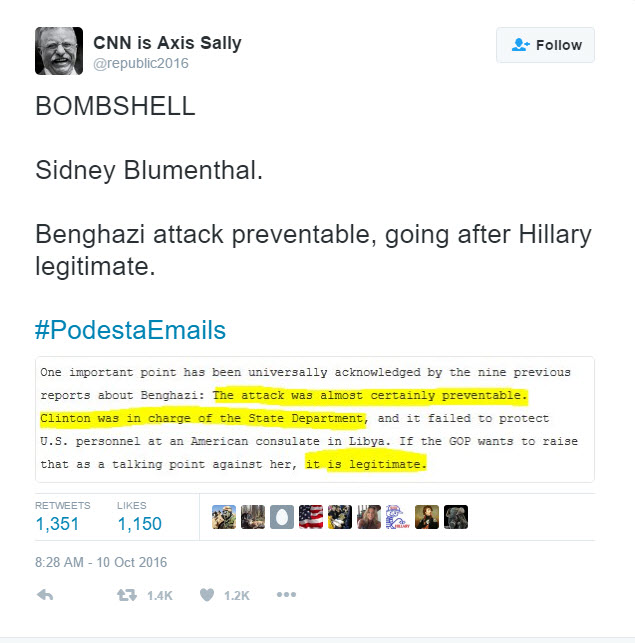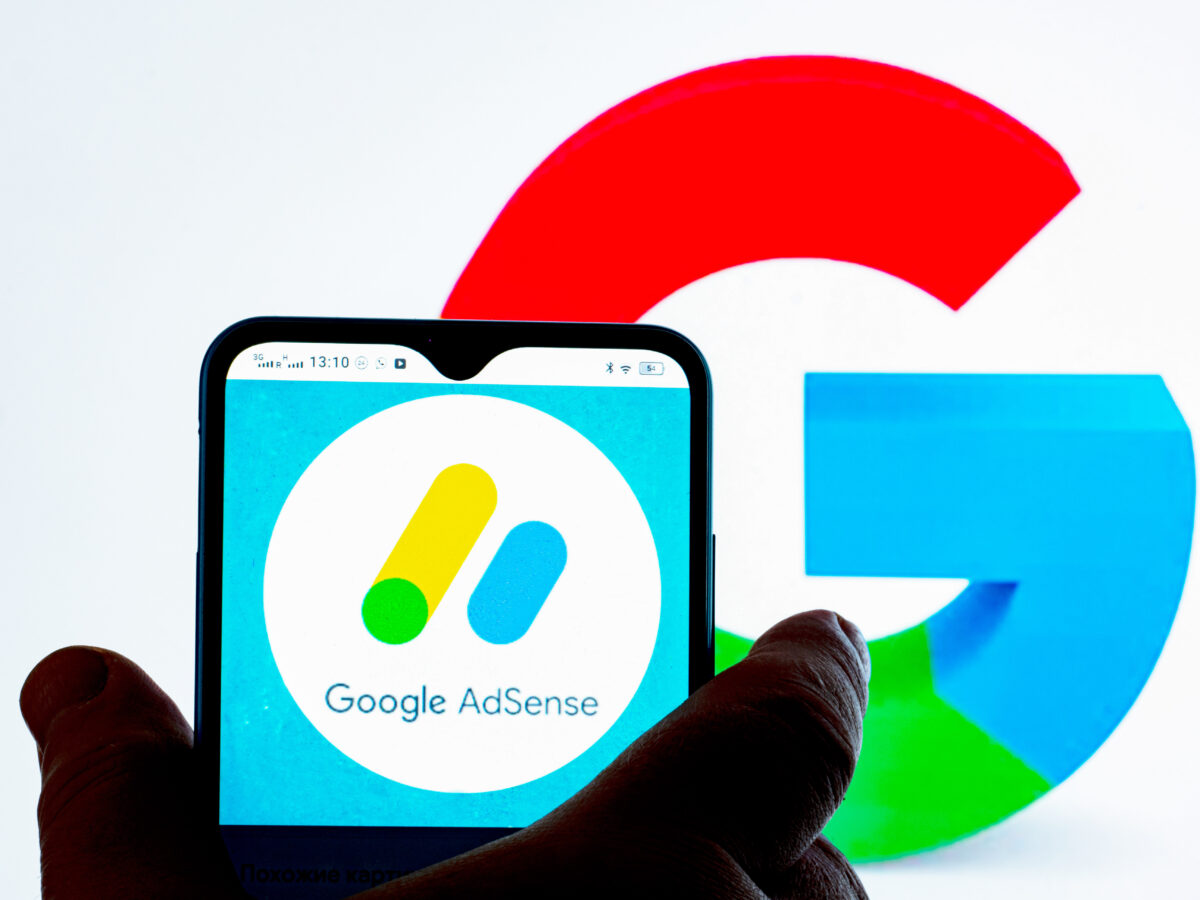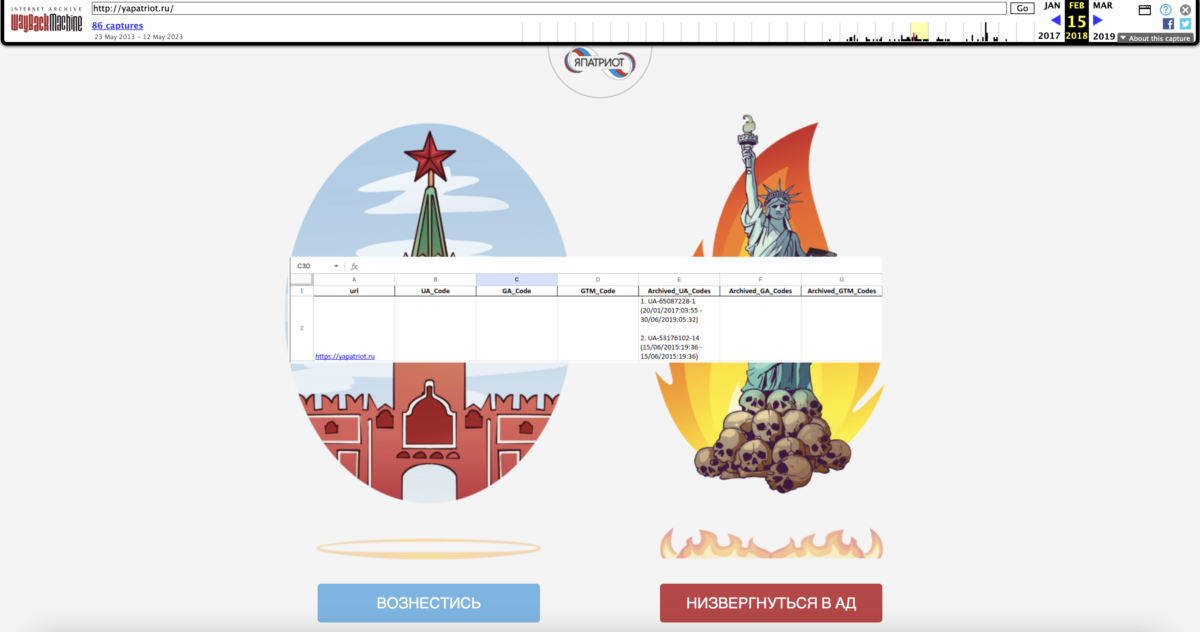Russia Was Not Behind Donald Trump's False Blumenthal-Benghazi Claim
2 November 2017 Update: Since the publication of this post, it has become clear that the Twitter account @TEN_GOP was operated by the so-called “Russian troll factory” of St. Petersburg. This account was one of the most vocal amplifiers of the Blumenthal-Benghazi story that was later published (then redacted) on Sputnik. While the central thesis of this post still holds, we now know that the “Russian troll factory” had a more notable role in spreading the Blumenthal-Benghazi story than first apparent one year ago, when this post was published.
On Monday, journalist Kurt Eichenwald published a story in Newsweek entitled “Dear Donald Trump and Vladimir Putin, I am not Sidney Blumenthal,” in which he describes how Donald Trump used information from Russian state-run news agency Sputnik regarding the 2012 Benghazi attack. During a rally on October 10, Trump quoted a document released by Wikileaks consisting of an email sent by Clinton advisor Sidney Blumenthal. This email was not original content from Blumenthal, but was actually a copy-pasted article written by Kurt Eichenwald in October 2015. Trump (or more accurately, his campaign staff) misunderstood or purposefully misrepresented the origin of the quotation and misattributed it to Blumenthal, while it was actually written by Eichenwald. In Eichenwald’s Newsweek article from Monday, the journalist attributes Trump’s “misunderstanding” to Sputnik, which published a story at 19:36 GMT (3:36pm Eastern Standard Time/New York) falsely attributing the quotation to Blumenthal. Sputnik deleted the story about four hours later, but it is preserved on Google Caches and Archive.is.

Source. Time zone in this screenshot is set to GMT+3
Eichenwald claims in his Newsweek article that “This false story was reported only by the Russian-controlled agency (a reference appeared in a Turkish publication, but it was nothing but a link to the Sputnik article).”
If the information recited by Trump truly first appeared in the Sputnik article, then Eichenwald may have a point: Trump’s campaign may closely monitor Sputnik, or there was some elaborate, coordinated effort. However, as some surface-level digging into the origin and dispersion of the information reveals, Sputnik was relatively late in publishing their information, and there is a very slim chance that there is any sort of coordination or connection between the Trump campaign and Sputnik, outside of their common tendency to find and repeat false and unverified claims.
Trump’s actual words
Trump held a rally in Wilkes-Barre, Pennsylvania on Monday evening, where he touched on a number of issues, including the Podesta emails released by Wikileaks. At one point, Trump touched upon a topic that he has spent a great amount of time on over the past few years: Benghazi, and his belief that Hillary Clinton was negligent, if not somehow complicit, in the attack on the American consulate.
https://www.youtube.com/watch?v=Y86z3k5s8XY&feature=youtu.be
Politfact transcribed this segment of Trump’s speech, with the bolded segments added by the author to mark the direct quotation being read by Trump, indicating the source where he received the information:
“Do you remember when Ambassador (Chris) Stevens in Benghazi was calling, and writing — they were desperate for help. They say like 600 times, right? The only one she was speaking to is Sidney Blumenthal, who’s a sleaze. He’s a sleaze. In fact, Obama wanted her restricted (so) that she couldn’t speak (to him). That’s probably one of the reasons she wanted to have her private server, you know? Because she promised Obama that she wouldn’t be talking to sleazy Sidney.
“So, Blumenthal writes a quote — this just came out a little while ago. I have to tell you this. (Trump reads from paper.) ‘One important point has been universally acknowledged by the nine previous reports about Benghazi’ — this is Sidney Blumenthal, the only one she was talking to. …
” ‘The attack was almost certainly preventable’ — Benghazi. ‘Clinton was in charge of the State Department, and it failed to protect the United States personnel and an American consulate in Libya’ — he meant Benghazi. ‘If the GOP wants to raise that as a talking point against her, it is legitimate.’
“In other words, he is now admitting that they could have done something about Benghazi. This just came out a little while ago.”
Thus, without the commentary provided by Trump in between reading from his notes, we can see that the exact quotation that Trump read from was:
One important point has been universally acknowledged by the nine previous reports about Benghazi. The attack was almost certainly preventable. Clinton was in charge of the State Department, and it failed to protect the United States personnel and an American consulate in Libya. If the GOP wants to raise that as a talking point against her, it is legitimate.
Nowhere does Trump cite a source for this information outside of Wikileaks, instead just saying that it “just came out a little while ago.”
Source of the quotation
In the original publication of his story, Eichenwald is clear in attributing the origin Trump’s quotation to Sputnik: he describes how “the Russians” selectively and incorrectly quoted him, how the “false story was reportedly only by the Russian-controlled agency,” and how someone in the Trump campaign “fed [Trump] false allegations at the same time they were being advanced in a Russian disinformation campaign.” However, there is absolutely no reason to believe that Sputnik was truly the origin for Trump’s quotation.
Sputnik published its story at 3:36pm Eastern Standard Time (New York). Over an hour before, at 2:32pm, a popular pro-Trump Twitter user @WDFx2EU7 (with over 40,000 followers) tweeted out the exact same quotation that Trump would recite, and that Sputnik would later publish:
https://twitter.com/WDFx2EU7/status/785548685983690752
If you scroll up a bit and read the exact words that Trump said, you will see that they are the exact same as the above tweet. Nowhere in Trump’s speech does he say a single word that can be found in the Sputnik article and cannot be found in the above tweet. But this was far from the only, or earliest, tweet that gathered hundreds and thousands of retweets with this quotation. More or less the same tweet came at 2:32pm from another pro-Trump user:
https://twitter.com/TEN_GOP/status/785550166958964737
And at 1:25pm:
#PodestaEmails2 Hillary camp admits Benghazi was "almost certainly preventable" and critisism of it "is legitimate." pic.twitter.com/KGGtDAqZ5f
— Shane K. ?? (@ShaneKPolitics) October 10, 2016
In fact, there were tweets going back almost 3 hours before the Sputnik story with the exact quotation read by Trump, including this one at 12:44pm:
Hard to see how Hillary ever recovers from #PodestaEmails2. Here is Sid's take on Benghazi: HRC could have prevented it. pic.twitter.com/mztt4MSB3h
— Caleb (@NC_Politico) October 10, 2016
Buzzfeed News deputy news director Jon Passantino discovered another now-deleted tweet was sent at 1:28pm EST with the exact same image showing the highlighted segments of the quotation later recited by Trump.
Source. Screenshot of tweet is from Pacific Time (GMT-7, and 3 hours behind EST)
Another tweet that went viral also contained the same image, but came 17 minutes after Sputnik published its story:
Deafening SILENCE from Media! #wikileaks Exposes ?Hillary's own Crooked advisor ?Sidney Blumenthal BLAMED Hillary for #Benghazi! pic.twitter.com/1VMgQAdnwF
— Amy Mek (@AmyMek) October 10, 2016
In sum, there were numerous tweets that went viral hours before the Sputnik story was posted, with hundreds of retweets from Trump supporters and manual retweets that were sent at the Trump campaign and its staff.
Spread of the Sputnik article
If the Sputnik article was the real source for Trump’s Benghazi comments, then one would expect the article to have spread a fair amount through the internet. As Eichenwald writes after talking with an anonymous source:
Because of its important role in the Russian effort, Sputnik does not simply publish whatever it chooses, the government official tells Newsweek. Articles pertaining to politics in the United States and Europe require high-level review. It is not clear if Russian authorities conduct that review, the official says, but no article directly related to American politics would just be sloppily thrown into public view without careful consideration.
With such importance placed on Sputnik and the “high-level review” necessary, we should expect to see tremendous promotion and spread of the story through the internet, perhaps facilitated by Russian bots and employees of Savushkina 55. Bellingcat is no stranger to such a campaign, with Sputnik and RT cooperating in various disinformation campaigns against our work regarding the downing of MH17. However, even the shallowest surveys of the spread of Sputnik’s October 10 article reveals that there was no such campaign or coordinated effort.
On Reddit, one of the most popular hubs for pro-Trump online supporters, the Sputnik article was posted only three times, and received a grand total of two comments between these posts. There were just over 30 manual Twitter shares of the story on October 10–a very popular method of popularizing stories from Russian bots–including numerous instances of apolitical Twitter bots automatically sharing it, in the same way an RSS feed would distribute a story. There were fewer than 40 shares of the story’s hyperlink as well. Another popular method of Russian campaigns is to copy an article’s content and repost it on numerous sympathetic sites, many of which operated by outlets such as the Federal News Agency (FAN), headquartered at the infamous address of Savushkina 55. We do not see this with the Blumenthal-Benghazi article, as the only results for the Sputnik article’s content are in obscure conservative message boards, and stories about the Newsweek article.
The Sputnik story was not at all popular, and received fairly little traction online–especially compared with the thousands of collective retweets from pro-Trump Twitter users sharing highlighted text that was quoted in Sputnik. In all probability, Sputnik decided to publish a story on the misattributed quotation because they saw these tweets, but did not do its due diligence in verifying the original quotation emailed by Blumenthal.
Response to claim of non-Russian source
Despite the existence of several viral tweets with the exact same content as Trump’s speech, perhaps Eichenwald has a point and that the true source of the quotation was Sputnik. In an update to his article, Eichenwald dismisses the notion that the viral tweets were the source for Trump’s Benghazi comments, and doubles-down on his claim that there was Russian involvement.
After Newsweek first published its article on Sputnik and the Blumenthal email, some reporters suggested that a tweet from an anonymous account may have been the source of the Russian article or Trump’s statement. An image attached to the tweet showed the sentences in question, but provided no indication that it came from an email. Based on the information from the government official with knowledge of the intelligence inquiries, Sputnik would never base a story it portrayed as the “October surprise” in the American election on a tweet with which it had no connection. The account in question is also quite unusual: it has put out an average of 285 tweets a day about American politics since it was created in February. (The account deleted the Blumenthal tweet on Monday). The image from the tweet could have been anonymous propaganda by someone who searched through thousands of words to find sentences to attribute to Blumenthal. More troubling, it could have been distributed over social media as a step in the Russian effort to quote an altered email in Sputnik; that would match the tactics described by the government official who spoke to Newsweek. Either way, Trump spread the same story that the Russian government was pushing, whether by quoting propaganda whose origin he did not know or by using information that originated from Sputnik.
Eichenwald only addresses one account, and seems to suggest that this account is connected with a Russian disinformation campaign. There is absolutely no evidence tying this account or the other accounts that tweeted out the image of the “Blumenthal” quotation to anything related to Russia.
In his article, Eichenwald never addresses a central question: what is the evidence that Trump was quoting from a Sputnik story, and not from one of the viral tweets that were spread hours before the article was published?



